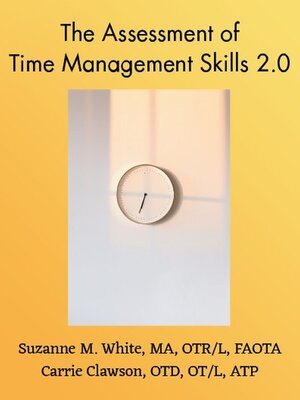The Assessment of Time Management ATMS 2.0 Manual
ebook ∣ Occupational Therapy: Time Management
By Suzanne M. White

Sign up to save your library
With an OverDrive account, you can save your favorite libraries for at-a-glance information about availability. Find out more about OverDrive accounts.
Find this title in Libby, the library reading app by OverDrive.



Search for a digital library with this title
Title found at these libraries:
| Library Name | Distance |
|---|---|
| Loading... |
Overview
Time management skills are necessary for fulfilling the demands of everyday life.
The Assessment of Time Management Skills (ATMS 2.0) is a self-administered questionnaire.
The ATMS 2.0 assesses everyday life time use strategies, which can support or interfere with the ability to consistently manage time effectively.
Executive functions underlie time management skills.
Benefits
The ATMS 2.0 consists of 27 items with a 4-point response scale and a range of possible scores from 27-108. The higher score represents better performance. The ATMS typically takes 10 minutes to complete. The electronic version provides immediate results.
The ATMS follows the World Health Organization (WHO) process of translation and adaptation of instruments. It has been translated into Spanish, Chinese, Swedish, Finnish, South Korean, Arabic, Persian and Portuguese.
Popularity can be attributed to the ease of administration, readability, general population norms, and immediate scoring response if using the electronic version. The publication of the research results that show the sub scales are sensitive to change.
Uses
It has been considered for use in rehabilitation for vocational, physical and psychiatric conditions including substance recovery. It has also been used in general education and research related to learning how to manage time, learning in time of COVID, enhancing independent living skills, reducing academic procrastination both in the classroom and during academic internships.







